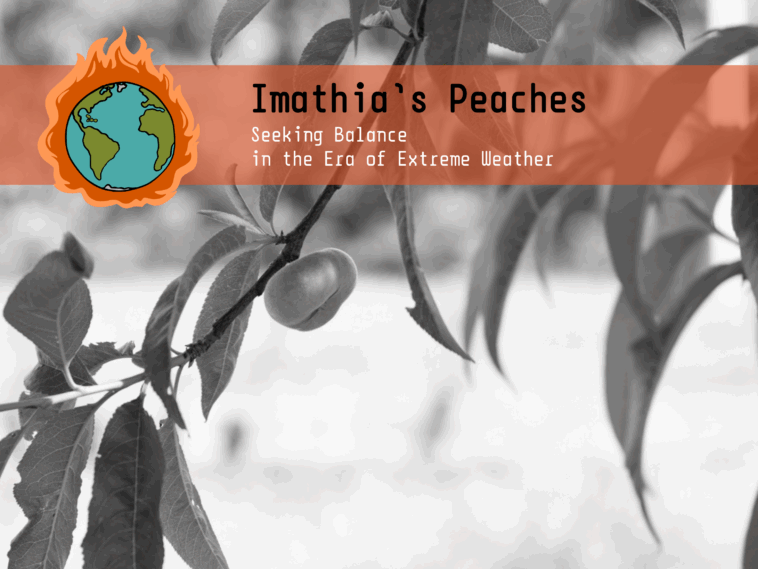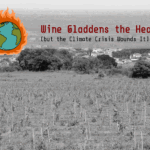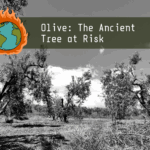“It’s pruning season,” he tells us, showing us a peach affected by green aphid. May in the regions of Imathia and Pella is a period of intensive work for one of Europe’s largest production centers for peaches and apricots. Vangelis Karaiandros, a third-generation peach grower in Agia Marina, Imathia, looks concerned as he guides us through a 90-stremma plot where he carefully carries on peach cultivation that is constantly being thrown off balance, both by the unpredictable symptoms of the climate crisis, and by the lack of systematic information and assistance for farmers from the state.
“If we had a normal crop, and not this year’s frost, there would be plenty of peaches. However, this year many varieties show a major decrease in production. Last year all these trees were full of fruit,” says Karaiandros, noting that the pruning process carried out during this period concerns only 20% of what it would in a typical year, something that negatively affects a whole set of tasks related to peach production.
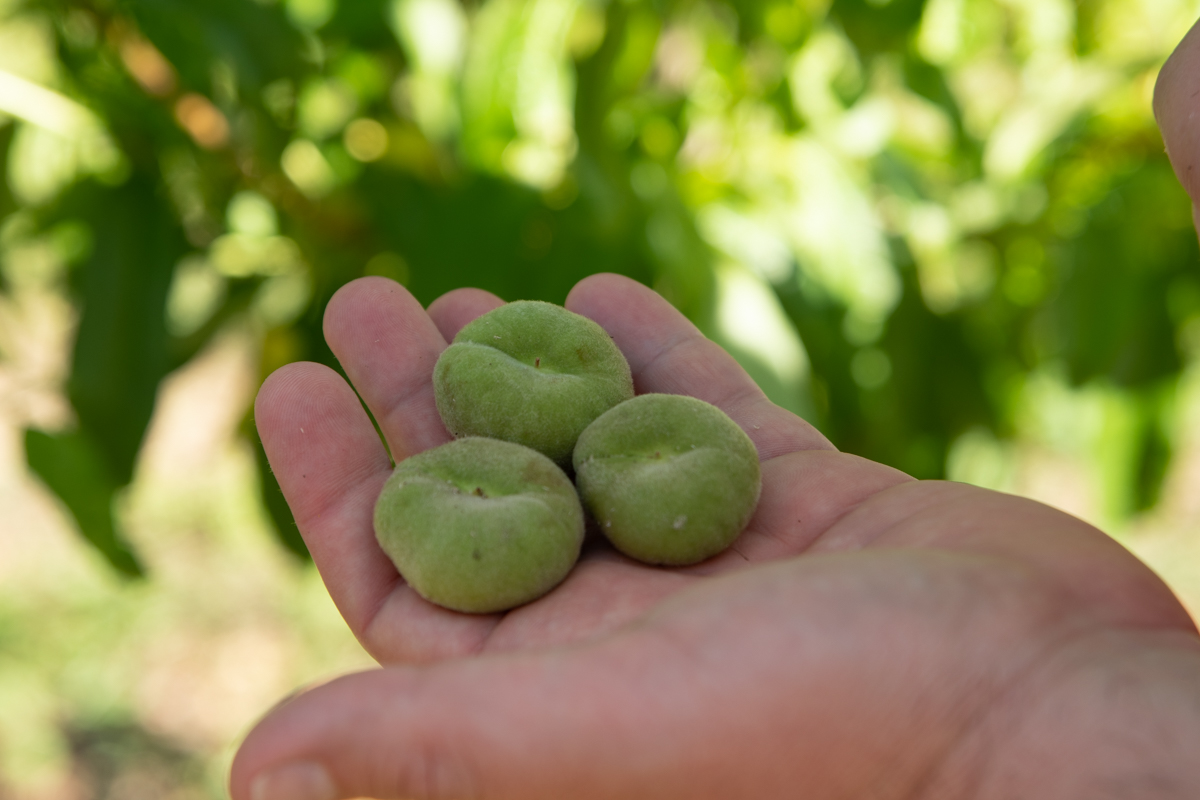
It has been less than a year since the Geotechnical Chamber of Greece (GEOTEE), Central Macedonia branch, sent a memorandum to the prime minister regarding the acute and rapid manifestation of the climate crisis, making special mention of tree crops and the problems facing peach production. The greatest issue, according to the conclusions drawn by expert scientists from AUTh, the International Hellenic University, and the ELGO-Dimitra institutes, is the observed inability to meet the required winter chill, resulting in small crop output or underdeveloped and deformed fruit. “Knowing a variety’s chill requirements is the most important measure for addressing climate change, as producers must choose varieties according to the new conditions taking shape in their region. There are significant differences among species, and among varieties within a species, in terms of the chill needed to break dormancy; however, unfortunately, there are no data for the large number of varieties released for cultivation in our country each year. Some 27.1% of peach varieties and 68% of apricot varieties may show unsatisfactory budbreak, prolonged flowering, or poorly developed flowers,” the memorandum states, among other points.
Watch the video: Climate Crisis threatens the peach production
Climate crisis is not just prolonged heat
Deciduous fruit trees have developed a natural resistance mechanism to cope with winter conditions: bud dormancy. Dormancy begins with leaf fall and lasts until budbreak, when the period of low winter temperatures has passed. To determine when they should exit dormancy, trees have developed a temperature measuring mechanism (memory) in which, during the first phase, they register their chill requirements, and during the second phase they transition out of dormancy and require higher temperatures1. Scientists have established that failing to satisfy winter chill requirements, which is becoming more frequent due to climate change, has negative effects on tree productivity.
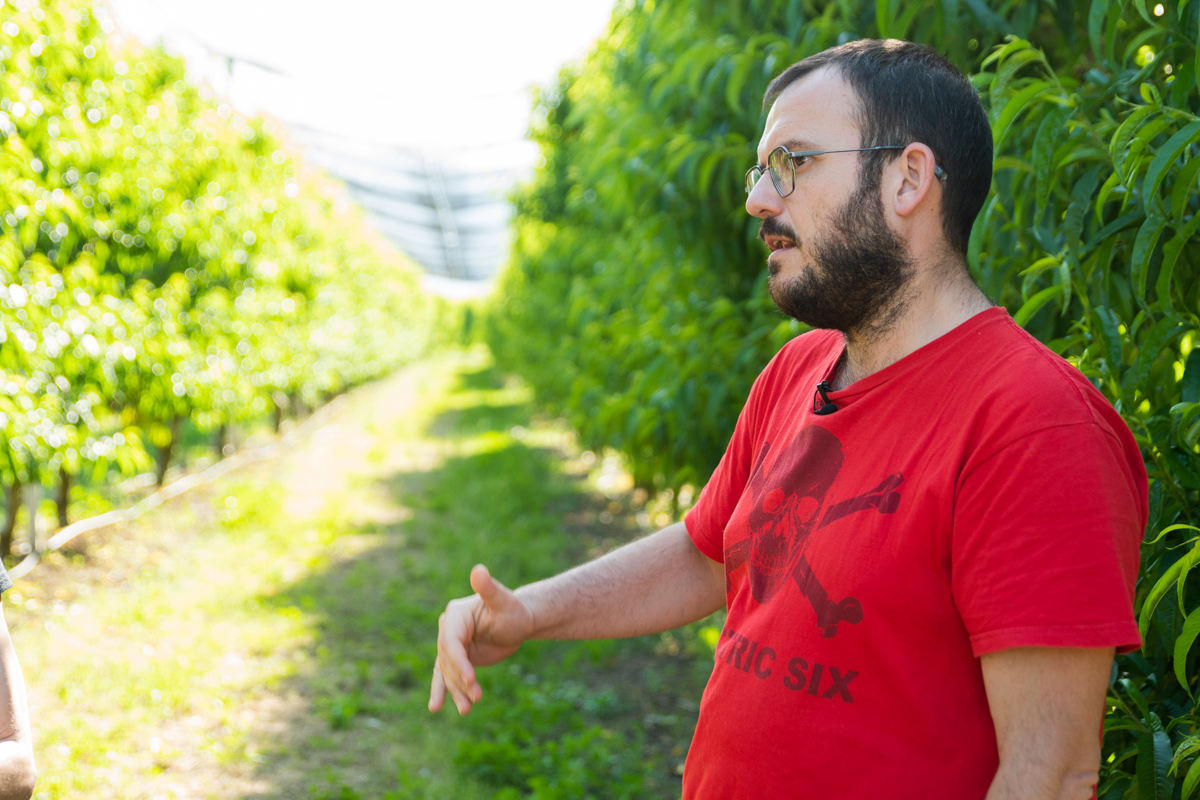
From his experience, Vangelis Karaiandros raises another parameter of the climate crisis. “The climate crisis is not a one-way street toward heat. While we’ve spent a decade saying temperatures are racing upward and we observe a trend toward global warming, in recent years in Central Macedonia we’re also being hit by frost.” According to him, in 2021, 2022, and this year as well, late spring frosts occurred that seriously affected production. In fact, data from cooperatives in both Imathia and Pella for 2025 reported damage due to late frosts of 90% in table peaches and 80% in table apricots.
Another phenomenon observed due to climate changes is very cold rains in the middle of summer. As the peach grower explains, because of these rains the trees’ defense mechanism breaks down. “A peach that is a few days away from ripening can withstand rain for a few hours. When it rains for two full days, the fruit hasn’t split, but its flesh collapses and the peaches start falling off on their own. This condition strains the trees; crops are lost and not compensated for. That’s because the compensation framework from ELGA is very ‘narrow’; it covers frost and hail from flowering until the fruitlet stage, but intense rainfall, for example, is not covered.” For producers, he continues, whether the crop is destroyed by hail, frost, or rain makes little difference because “a lost crop, when it’s not our fault and there was no way to save it, hits the most vulnerable. A bad year can be the final blow, a death sentence in this profession for some growers.”
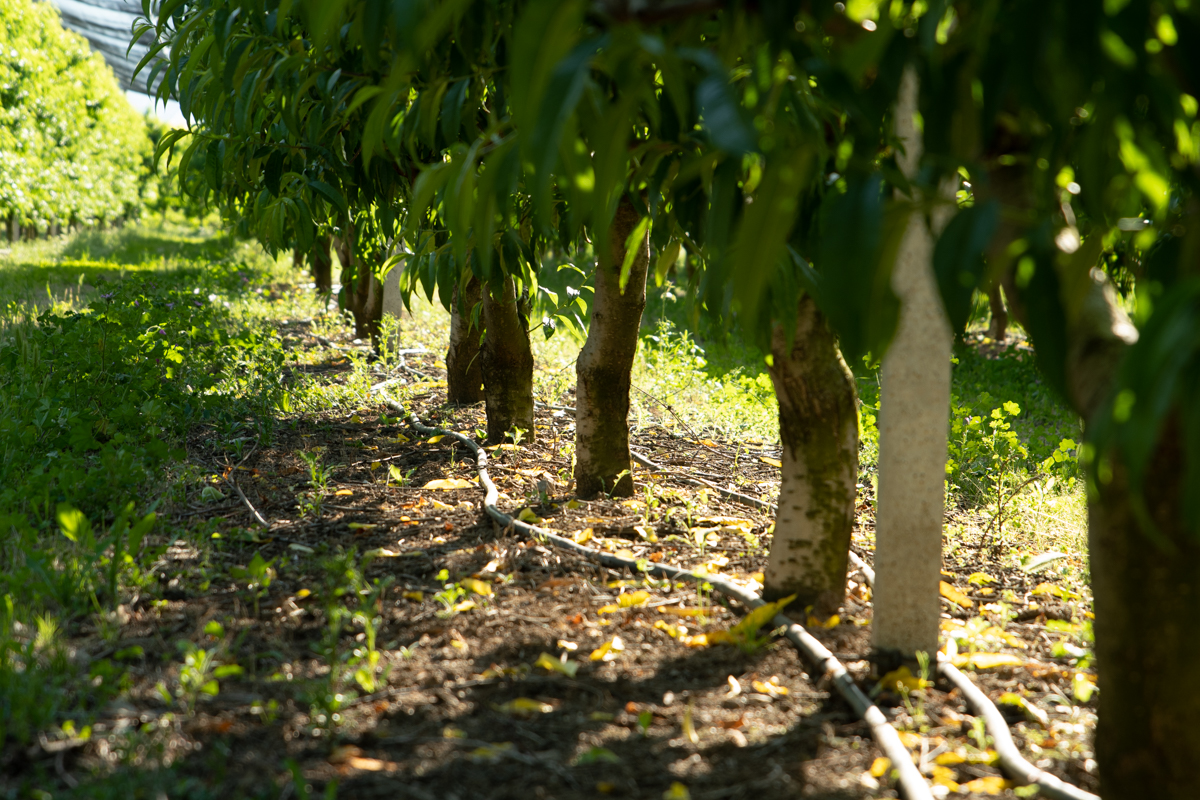
Research by the Department of Deciduous Fruit Trees in Naousa has been discussing the climate crisis since 2016
How did the climate crisis appear in the area? According to peach growers, there was great concern from 2017 onward because of intense heatwaves. “While the peach tree is a species that tolerates heat, what is called mild scorching conditions, when the prolonged 38-40°C days begin, the trees fall into a dormancy, a ‘siesta,’ and stop growing; that is, the progress toward ripening stops,” adds Karaiandros.
It is noteworthy that climate change and its impacts on peach production have been recorded by the Department of Deciduous Fruit Trees (T.F.O.D.) in Naousa since 2015–2016 as a sequence of drought, warm winter periods, and unusual summer rainfall. “We went through an unusually rainy summer in 2014, followed by the dry summer of 2015, the warm winter period of 2015–2016, and temperature fluctuations during the flowering period in 2015 and 2016, creating adverse conditions for peach cultivation,” writes Dr. Pavlina Drogoudi of ELGO-DIMITRA and the Institute of Plant Breeding and Genetic Resources, Department of Deciduous Fruit Trees (T.F.O.D.) Naousa, in an article in the journal Agriculture – Livestock2.
According to the results of an analysis of historical meteorological data recorded at T.F.O.D. Naousa, the annual mean temperature increased by 1.3°C over the last 52 years (1963–2015), showing that climate change is a reality in Imathia (Figure 1) (3). Dr. Drogoudi notes that the flowering time of fruit trees is greatly influenced by temperature changes. According to the research, priority should be given, because of climate change, to the development of varieties suited to adverse conditions.
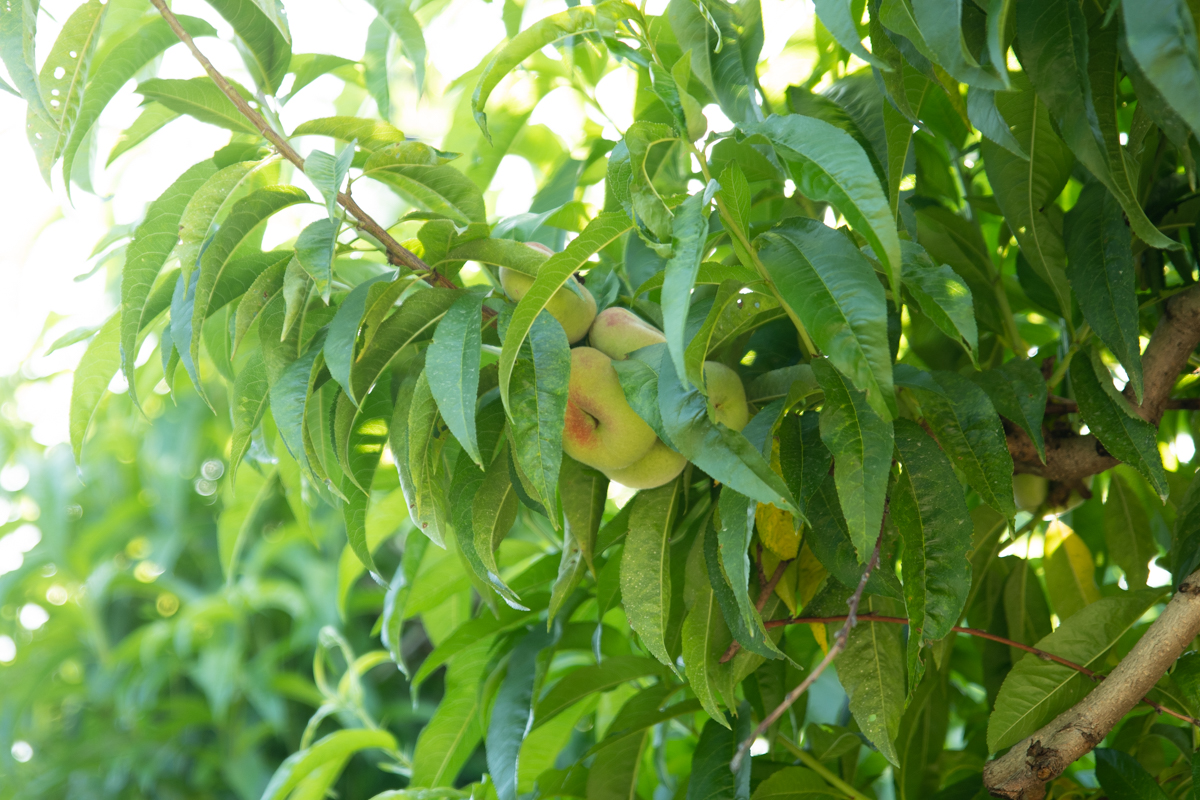
“The only intervention carried out by the state has been by the Institute of Deciduous Trees. They, I can say, have conducted research on the issue with artificial summer rainfall and applications of certain biological formulations to see how the fruit can withstand rain. I believe the government has no idea about the problems and doesn’t want to learn. Each government sometimes hands out compensation money, and that’s where their intervention ends, because it’s considered an effective voting incentive. I believe that intervention can be achieved through research, and the Institute should be funded to develop strategies to confront the phenomenon,” says Karaiandros.
A different approach to agriculture is needed
Blooming peach orchards may create impressively beautiful images across the endless pink fields, but the discussion has begun about the problems that peach monoculture can cause: “Monoculture intensifies all the problems a crop has. When diseases and ‘pests’ feed on their host, meaning the more peach you provide to the enemies, the greater the plant protection problems,” says the peach grower, while also pointing out the reasons this crop prevailed. “It was a profitable crop that, when in the 1960s other regions were emptied out due to emigration and poverty, this region could make a living through export trade to Germany. So people are aware that it’s a profitable crop; it’s also a crop they know, they have the know-how, and they have commercial structures, packing houses, etc.” On the other hand, he says, “when we depend so heavily on the peach, if it is hit by an insect or a virus, you realize that we face collapse.”
At the same time, methods such as regenerative or organic agriculture have not had much traction in the area because “the peach tree is an alien species; it came here 100 years ago. That means it hasn’t acclimatized like the olive or the vine, which are native species that have reached their own balance. The peach is a new organism that new diseases and enemies keep disrupting, and there are not organic products and solutions for everything available.”
Having applied organic methods in recent years to tackle insects that attack the peach, he concludes that an entirely different mindset is needed in agricultural practice: “The new agriculture, and an organic farmer knows this very well, doesn’t rely on ‘apply-and-leave’ solutions. He lives in his field, listens to it, and responds very specifically and very carefully; it’s not the mindset of going to the agronomist every 10–15 days to spray. There can’t be an organic equivalent fungicide, aphicide, or insecticide that will simply let us do the same cultivation organically. Organic farming requires much closer monitoring, much more effort, and you yourself must be a small agronomist in your field.”
The reflection on methods used in peach cultivation ends with the most pressing problem posed by climate change: water scarcity. Although the plain of Imathia is surrounded by mountains and water availability is considered sufficient, irrigation is done using traditional methods, such as flood irrigation, which do not conserve water.
V. Karaiandros expresses concern for the future: “How we prepare for climate change is important, because there is a risk of dry years coming, with reduced water availability in the summers. We’ve become completely complacent and are still irrigating with ancient methods. Flood irrigation can be done correctly and even that isn’t done right, we often have open channels everywhere, and thus evaporation, irregular flows, etc. There are modern methods that save water, such as drip irrigation with closed systems, but the state hasn’t made provisions for this. Some local politicians implemented such systems in a few places in their own villages, through their personal intervention, but in principle this should be a state responsibility for everyone.”
Up next: Wine gladdens the heart, but the climate crisis wounds it
The research “The Climate was already bad” was realised with the support of Rosa Luxemburg Stiftung-Office in Greece. Read the complete research here.
- Παντελίδης Γ., Δρογούδη Π. Βασιλακάκης Μ. 2018. Χειμερινός λήθαργος φυλλοβόλων οπωροφόρων και ακρόδρυων δένδρων. Ι. Επιπτώσεις μειωμένου ψύχους στην παραγωγικότητα και πρακτικές αντιμετώπισης. Γεωργία-Κτηνοτροφία 4, σελ. 30-34. [↩]
- Pantelidis G., Drogoudi P., & Vasilakakis M. (2018). Winter dormancy of deciduous fruit and nut trees. I. Effects of reduced temperature on productivity and management practices. Agriculture–Livestock, 4, 30–34. [↩]
